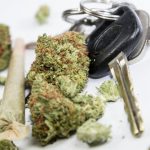Don’t drive high — not even a little, not even a short distance, not ever.
It’s not a hard message. It’s the same message we send with alcohol.
And yet, clearly drivers in Colorado are continuing not to heed that advice. We see it in the streets with people actively smoking marijuana and driving. And now we see it in data gathered by The Denver Post’s David Migoya that shows marijuana-related traffic fatalities are on sharp rise.
The most disturbing part of Migoya’s investigation is that fatalities attributed to drivers impaired with marijuana are growing. In 2013, Colorado drivers tested positive for the drug in about 10 percent of all fatal crashes. By 2016, it was 20 percent. It jumped from 47 fatal crashes statewide in 2013 to 115 in 2016 — a 145 percent increase.
Migoya also found that drivers increasingly are killing people with only marijuana in their systems. Of the drivers involved in fatal crashes in 2014 who tested positive for cannabinoids, or CBD, more than 52 percent had no alcohol in their system. By 2016, it had grown to 69 percent.
This isn’t fake data — federal data shows that during this time, testing for pot didn’t increase appreciably — but the data should be taken in context and public policy should respond accordingly.
For starters, drunken drivers still kill far more people than high drivers and no one is talking about returning to prohibition of alcohol. Instead drunken driving is met with public awareness campaigns and harsher sentencing. Public policy experts should take note and push for an aggressive enforcement of all impaired driving.
After years of trying, lawmakers finally set a legal limit for active tetrahydrocannabinol, or THC, in someone’s system at 5 ng/mL. That law has helped law enforcement win driving-under-the-influence convictions in court, but Colorado law is such that a reading above 5 ng/mL is only part of the case to prove intoxication. Breath or blood tests exceeding the legal limit for alcohol cannot be fought in court on the basis of non-impairment like marijuana can. That also means if someone badly fails a field sobriety test but has low levels of THC, they could still be convicted.
That actually makes sense, because scientists tell Migoya that even active THC doesn’t always represent the level of impairment in an individual.
Greenwood Village Police Chief John Jackson said it costs $500 for a blood test and takes two hours. That’s a hard order to fill if the subject has already tested above the legal limit for alcohol in an easy roadside test. More funding from lawmakers would certainly help — fortunately there’s a fund for just such purposes supplied by taxes on our legal marijuana systems.
Science is evolving and hopefully roadside saliva tests will become a tool for determining when someone is impaired by marijuana. But while we wait for science, lawmakers should consider revisiting laws, perhaps making offenses that involve both marijuana and alcohol impairment more severe.
Law enforcement must find a way to focus on prevention with high driving. Catching high drivers before they crash and putting them in jail, suspending their licenses and levying hefty penalties would send a strong message to those who might consider getting behind the wheel after smoking or consuming marijuana.
We fear some groups and U.S. Attorney General Jeff Sessions will latch onto this data and point to it as support for ending Colorado’s experiment with legal recreational marijuana. While we take the tragic stories of loved ones lost in Migoya’s stories to heart, we’re certainly not ready to upend a thriving and responsible marijuana industry because of the poor choices of individuals.
(1080)





Leave A Reply